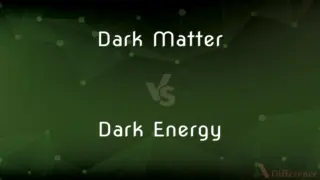Database vs. Repository — What's the Difference?
By Fiza Rafique & Urooj Arif — Updated on March 25, 2024
A database is a structured collection of data, managed by a database management system (DBMS), supporting a wide range of data types and queries. A repository, while also a data storage system, is typically used to store, manage, and track code.

Difference Between Database and Repository
Table of Contents
ADVERTISEMENT
Key Differences
Databases are designed to store, retrieve, and manage data efficiently, using complex queries and transactions. They are essential for applications requiring rapid access to structured data, like customer information or financial records. Whereas repositories are more focused on content management and version control, making them ideal for software development projects where tracking changes and collaborating on code or documents is crucial.
In terms of structure, databases often utilize tables, rows, and columns to organize data, allowing for sophisticated querying, indexing, and data relationships. This structure supports a wide variety of data types and complex transactions. On the other hand, repositories are structured to manage files and directories, focusing on the versioning of these items rather than complex data relationships or querying capabilities.
Databases are managed by database management systems (DBMS), which provide tools for data insertion, querying, updating, and administration. These systems support data integrity, security, and backup mechanisms. Conversely, repository management systems like Git or Subversion specialize in version control, enabling multiple users to work on the same files simultaneously, track changes, and revert to previous versions if necessary.
The use of databases is prevalent in applications that require dynamic data storage and fast access, such as web applications, banking systems, and customer relationship management (CRM) systems. Repositories, however, are indispensable in the realm of software development, document management, and any scenario where version control is a priority, facilitating collaboration and change management.
While databases and repositories can sometimes overlap in functionality—such as when a repository stores its data in a database—their primary purposes and use cases remain distinct. Databases are the backbone of data-driven applications, focusing on efficient data storage and retrieval. Repositories, with their emphasis on version control and collaboration, are essential for managing codebases and documents in a controlled and collaborative environment.
ADVERTISEMENT
Comparison Chart
Primary Purpose
Efficient storage, retrieval, and management of structured data
Storage, management, and tracking of code, documents, or specific content with version control
Structure
Organized in tables, rows, and columns to support complex queries
Organized in files and directories with emphasis on versioning
Management System
Managed by a Database Management System (DBMS)
Managed by version control systems (e.g., Git, Subversion)
Use Cases
Web applications, financial systems, CRM systems
Software development, document management
Focus
Data integrity, security, and fast access
Collaboration, change tracking, and version control
Compare with Definitions
Database
Used in dynamic data storage applications.
The e-commerce platform uses a database to manage inventory and sales data.
Repository
Essential in software development.
The team uses a repository to manage feature branches and releases.
Database
Supports complex queries.
The database quickly retrieves all orders from the last month.
Repository
Can store code, documents, or specific content.
The documentation repository tracks all changes to the user manuals.
Database
Ensures data integrity and security.
The database enforces user permissions to protect sensitive information.
Repository
Storage system for managing and tracking changes.
The project's source code is stored in a Git repository.
Database
Structured collection of data.
The customer database stores contact information and purchase history.
Repository
Facilitates collaboration among users.
Developers use the repository to merge changes and resolve conflicts.
Database
Managed by a DBMS.
MySQL and Oracle are popular databases for web applications.
Repository
Emphasizes version control.
The repository allows rolling back to previous versions if an update causes issues.
Database
In computing, a database is an organized collection of data stored and accessed electronically from a computer system. Where databases are more complex they are often developed using formal design and modeling techniques.
Repository
One who is entrusted with secrets or confidential information.
Database
A collection of data arranged for ease and speed of search and retrieval. Also called data bank.
Repository
A place where things may be put for safekeeping.
Database
To put (data) into a database.
Repository
A warehouse.
Database
(general) A collection of (usually) organized information in a regular structure, usually but not necessarily in a machine-readable format accessible by a computer.
I have a database of all my contacts in my personal organizer.
Repository
A museum.
Database
(computing) A set of tables and other objects (queries, reports, forms) in the form of a structured data set.
The "books" database will have three tables, and the "customers" database will have two tables.
Repository
A burial vault; a tomb.
Database
A software program (application) for storing, retrieving and manipulating such a structured data set.
Which database do you use: MySQL or Oracle?
Repository
One that contains or is a store of something specified
"Bone marrow is also the repository for some leukemias and lymphomas" (Seth Rolbein).
Database
A combination of such data sets and the programs for using them.
Repository
A location for storage, often for safety or preservation.
Database
To enter data into a database.
Repository
(computing) a storage location for files, such as downloadable software packages, or files in a source control system.
Database
An organized body of related information.
Repository
A burial vault.
Database
An organized body of related information
Repository
(figurative) A person to whom a secret is entrusted.
Repository
(dated) A place where things are kept for sale; a shop.
Repository
A place where things are or may be reposited, or laid up, for safety or preservation; a depository.
Repository
A facility where things can be deposited for storage or safekeeping
Repository
A person to whom a secret is entrusted
Repository
A burial vault (usually for some famous person)
Common Curiosities
Can a repository be considered a type of database?
In a broad sense, yes, since it stores data, but it specializes in version control and collaboration rather than complex data querying.
Can a database store files and documents like a repository?
Yes, databases can store files and documents, but they lack the version control and collaboration features of repositories.
What role does a DBMS play in the use of databases?
It facilitates the creation, manipulation, querying, and management of databases, ensuring efficient data handling and integrity.
How do databases handle security?
Databases use mechanisms like user authentication, permissions, and encryption to ensure data integrity and security.
What is the main difference between a database and a repository?
Databases focus on structured data storage and retrieval, while repositories manage and track code or documents with version control.
What is a DBMS?
A Database Management System (DBMS) is software that provides tools for managing, querying, and administering databases.
Why is version control important in repositories?
It enables tracking changes, collaboration, and restoring previous versions of the content, which is crucial in software development and document management.
How do databases and repositories differ in their approach to data structure?
Databases use structured formats like tables for data, while repositories focus on file and directory structures with versioning.
Can a repository function without a version control system?
No, version control is fundamental to a repository's purpose and functionality.
What makes a repository ideal for collaboration?
Its version control system allows multiple users to work simultaneously, track changes, and merge modifications efficiently.
How does version control in repositories enhance security?
It maintains a history of changes, allowing recovery from unauthorized or erroneous modifications and tracking who made each change.
Are repositories only used for software development?
While often associated with software development, repositories can also manage documents, digital assets, and other content types needing version control.
Can the content of a repository be queried like a database?
Repositories are not designed for complex queries but for tracking changes, though some search functionality exists for finding specific revisions or content.
How do databases support complex transactions?
They use transaction management features of the DBMS to ensure data consistency and reliability during multiple operations.
What is a common use case for repositories outside of software development?
Managing and versioning project documentation or any digital content where tracking changes over time is valuable.
Share Your Discovery

Previous Comparison
Chablis vs. Sancerre
Next Comparison
Balustrade vs. ParapetAuthor Spotlight
Written by
Fiza RafiqueFiza Rafique is a skilled content writer at AskDifference.com, where she meticulously refines and enhances written pieces. Drawing from her vast editorial expertise, Fiza ensures clarity, accuracy, and precision in every article. Passionate about language, she continually seeks to elevate the quality of content for readers worldwide.
Co-written by
Urooj ArifUrooj is a skilled content writer at Ask Difference, known for her exceptional ability to simplify complex topics into engaging and informative content. With a passion for research and a flair for clear, concise writing, she consistently delivers articles that resonate with our diverse audience.















































